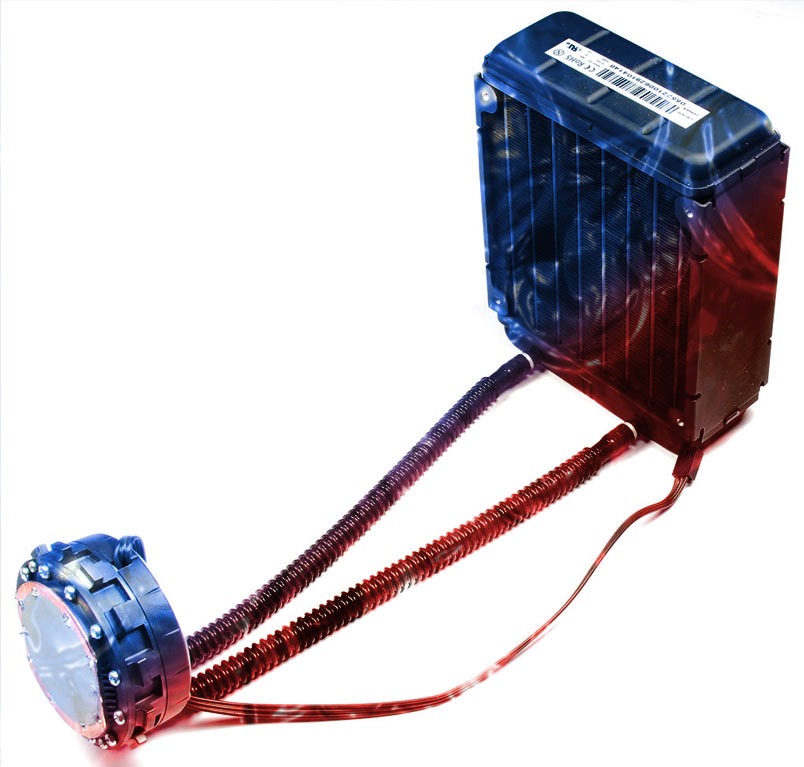Corsair H70: Next-Gen Self-Contained Liquid Cooling
Liquid cooling still has the image of being expensive and complicated. Corsair, in cooperation with the cooling specialists at Asetek, now offers the H70 that aims to simplify the step up from air cooling. Can it beat less expensive premium heatsinks?
Liquid Cooling For The Mainstream
Liquid Cooling: Pros And Cons
Anyone familiar with the subject of liquid cooling knows that it can be quite a challenging topic with which to deal. What components do you need to buy? Should you buy individual parts or go for a pre-assembled system? Which manufacturer can you trust as you contemplate adding water inside your PC?
These are probably the most frequently asked questions when an enthusiast first contemplates entering the world of liquid cooling. However, things have changed in recent years. Last year, we looked at one of the first self-contained liquid cooling solutions, Corsair's H50, and found it to be comparable to some of the air coolers out there. That's not particularly ideal when you're trying to preach the benefits of liquid cooling. However, the device did successfully fit in environments where larger air coolers simply couldn't.
We now have the company's follow-on to the H50, called the H70, which again demonstrates that liquid cooling doesn't have to involve a complex setup procedure. But does it improve on the H50's performance?
H70: Prefab Liquid Cooling From Corsair
This is where the Corsair H70 liquid cooling system comes into play. It is designed to achieve high cooling performance, low noise levels, and simplify installation by as much as possible. Just like the previous model, the Corsair H50, the Corsair H70 is a complete closed loop cooling system consisting of a radiator, hoses, CPU water block, fan, and coolant, fully assembled from the factory. In addition to making the installation easier, this also saves you the trouble of gathering the necessary components yourself.
The Corsair H50 cooling system was the first result of cooperation between Corsair and the manufacturer Asetek, the company behind the CPU freezer Vapochill that let you operate your CPU at -20°C back in 2003. The challenge, here, of course, is trying to exceed the capabilities of today's greatest air coolers from a liquid-cooled circuit. This isn't something the H50 was really able to do, but our expectations of the improved H70 are naturally much higher.
Get Tom's Hardware's best news and in-depth reviews, straight to your inbox.
Current page: Liquid Cooling For The Mainstream
Next Page Corsair H70: Design And Technical Data-
wribbs "street price of around $110, it is reasonably priced" -too high.Reply
"slightly elevated background noise" -understatement
You will be better served by the h50, yes its weaker but its cheaper and quieter and performs close to the same. Do yourself a favor and avoid this product although it is quite good.
-
karma831 Overpriced, equal to or gets beat by air cooling in temps, and is pretty loud...Doesn't sound like a very good product ?__?Reply
The prolimatech and noctua offerings are much better. -
maxal Would it be possible to post combined charts of idle temp/noise and full load temp/noise ? IMHO that would be more informative than plain bars, as many are interested in balance of those characteristics.Reply
-
gkay09 I had expected to see even the CM Hyper 212+ results...Reply
IMO $110 for such a cooler not worth it,...Other good option if going for a closed loop cooler would be the CoolIT SYSTEMS ECO... -
cmcghee358 I would have also liked to have seen comparison between a push/pull exhaust, and a push/pull intake.Reply
For my H50, it is quite explicit that the radiator should be pulling outside air through the fins. And yet, people keep it as an exhaust and then lament of their temps.
One of the biggest perks of a closed loop water cooling system is you dictate what air is being used. Where-as big air is always restricted to case air(unless a side is removed and a box fan is added)
I would have also liked to of seen it as a delta above ambient, rather than a flat CPU temperature comparison. I personally process the delta better, and lend more credence to it. -
uruquiora would have liked to see the temps in passive mode, with no fans, and on a more recent CPU...Reply -
mjello I want one for my gfx card not the cpu. Its my gfx thats noisy. I don't care about cooling temps or overclocking as long as the cooling is adequate. I just want sweet silence :).Reply -
cmcghee358 Reply9503478 said:I want one for my gfx card not the cpu. Its my gfx thats noisy. I don't care about cooling temps or overclocking as long as the cooling is adequate. I just want sweet silence :).
I guess you missed the part where it was the noisiest thing on the list with a 57.3 dB at max?
Also considering the TDP of some of these GPUs are between 190 and 300W, you can expect the H70 to work much harder thant he sample 130W CPU. So it will most likely be loud all the time because of the higher operating temps of the GPU.

